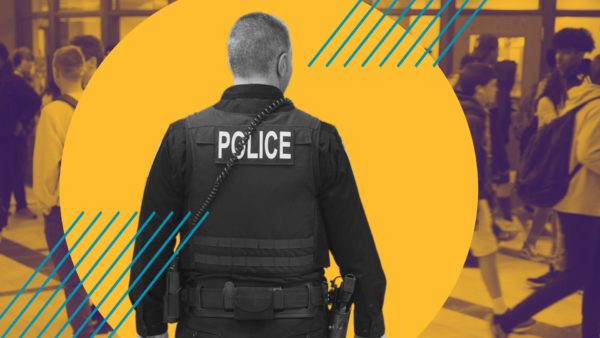DURHAM, N.C. (Aug. 5, 2024) — School resource officers (SROs) create an unsafe environment for children, according to part one of a new series, Reframing Public Safety, from Southern Coalition for Social Justice (SCSJ).
SCSJ’s Reframing Public Safety explores, interrogates, lifts up, and shares policies and practices that increase public safety, strike the right balance between accountability and repair, and center dignity, stability, and justice for all.
In the first part of this series, as part of its focus on school policing, SCSJ created a first-of-its-kind tool aimed to empower students, parents, and school employees to navigate local policies about how to file grievances in connection with SROs. This tool includes every North Carolina school district’s complaint process with detailed instructions for students, parents, and employees who may wish to file a complaint about an interaction with an SRO.
“We should not continue to use outdated and coercive methods that don’t keep students and staff safe,” said Ian Courts, counsel for Justice System Reform at SCSJ. “Instead, we must invest in students, their families, and teachers, and encourage school districts and local governments to think more creatively about safety. Police in schools is not the answer.”
Click here to read part one of the series.
Programs that put police in schools do not increase safety for students or staff. Instead, police presence in schools undermines equitable learning environments and increases the likelihood that students will be disciplined or criminalized, especially Black and brown students and those with disabilities.
This part of the new series includes challenging the all-too-common assumption that police are a prerequisite for safety in schools — SCSJ offers data on SROs on campuses, examples of communities who successfully removed police from their schools, and recommendations on how schools across the South can make their environments a safer place for all students. These recommendations include:
- Remove SROs from schools. These programs do not have a proven track record for increasing school safety, fuel the school-to-prison pipeline, and require enormous financial investment from the communities they purport to serve.
- Strictly limit and clearly define the role of SROs when they are used in schools to avoid SROs from inappropriately enforcing school policies.
- Collect and publish data on all SRO-related incidents in school to allow for transparency and accountability around how SROs interact with students.
An overview of the multi-part Reframing Public Safety Series:
Safety is a basic human need. Everybody deserves to be and feel safe.
But what actually keeps people safe? And whose safety is being prioritized? For too long, approaches to public safety have been driven by anecdotal, fact-free notions about crime and punishment. Too often, these notions are fueled by fear, panic, racism, and misinformation. The result is a deeply flawed, overly punitive, racist, anti-evidence approach that is not closely tied to policies that actually keep people safe or protect all communities fairly.
At SCSJ, we reject the argument that efforts to interrupt and change our current system somehow threatens public safety. It is not safety versus justice; that is a false choice.
We also reject the premise that these massive problems, which are deeply embedded within our existing systems, are unbreakable and unsolvable. In fact, solutions exist for keeping communities safe while respecting the dignity and rights of everyone.
Over the course of this series, SCSJ will highlight a number of issues that sit at the center of our public discourse on safety — from second chances to reducing prison populations to restorative justice to accountability for decision makers. Over the course of this series, SCSJ will highlight a number of issues that sit at the center of our public discourse on safety — from second chances to reducing prison populations to restorative justice to accountability for decision makers.
###
Southern Coalition for Social Justice, founded in 2007, partners with communities of color and economically disadvantaged communities in the South to defend and advance their political, social, and economic rights through the combination of legal advocacy, research, organizing, and communications. Learn more at southerncoalition.org and follow our work on Twitter, Facebook, and Instagram.

